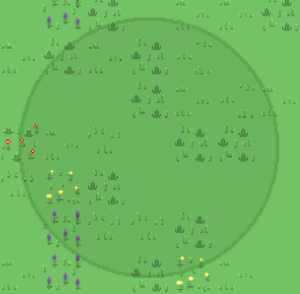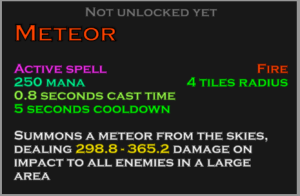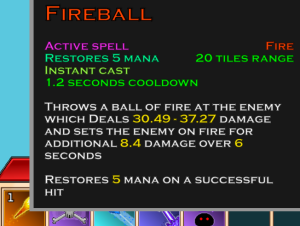Spell mechanics
Using spells
To use spells, you have to first drag them out of the skills window to your ability bar. Then you have to either use the keybind it's assigned to or click on its icon.

Spells can be aimed in 2 different ways based on the spell
- Manual targetting - Pressing the spell's keybind fires the spell at your mouse cursor's location
- Automatic targetting - Pressing the spell's keybind either finds the nearby enemies or doesn't require a target (like shields).
Note: All spells with a cast time require casting
Some manually targetted spells show an area of effect circle. This circle shows you the area affected by this spell (e.g. radius where the spells does damage to enemies).

You can see it by pressing or by holding the spell's keybind. If you're holding the keybind of certain spells, you can move the area of effect circle and cast the spell on that location by releasing the keybind. You may hit enemies slightly outside of the circle as a small portion of their hitboxes can still be inside of it.
| Spell | What the area of effect circle shows |
|---|---|
| Area where all enemies will be hit | |
| Area where all enemies will be hit | |
| Maximum range of teleportation | |
| Area where all enemies will be hit | |
| Area where all enemies will be hit |
Casting spells
Some spells need to be casted first. This can be seen in their tooltip. You can cast while moving but you move 40% slower while doing so.

If there is nothing about the cast time, this spell is always casted instantly.

Some spells (E.g.![]() Eradication beam) need to be channeled. Channeled spells repeatedly do something (like doing damage) for as long as you keep channeling them.
Eradication beam) need to be channeled. Channeled spells repeatedly do something (like doing damage) for as long as you keep channeling them.
You can stop casting / channeling by pressing the ESC button.
Cooldown
Cooldown prevents you from casting the same spell twice in a too fast succession. Most of the spells have their own cooldown with a few exceptions (like ![]() Shadowlight barrier,
Shadowlight barrier, ![]() Fire barrier and
Fire barrier and ![]() Ice barrier sharing the same cooldown).
Ice barrier sharing the same cooldown).
Global cooldown (Removed - this text is left here just in case it gets readded)
Global cooldown is a special form of cooldown which triggers any time you start casting a spell. It lasts 1.2 seconds by default (which can be decreased by haste) and prevents you from casting any other active spell. Since global cooldown affects only active spells, it isn't explicitly mentioned in the game but all spells affected only by the global cooldown show it in their tooltip.

 Fireball tooltip with global cooldown as its only cooldown.
Fireball tooltip with global cooldown as its only cooldown.Spell queue
If you cannot cast an active spell right now, it gets saved if all these conditions are valid.
- If this spell has a cooldown, it has to be under 0.4 seconds
- If you're currently casting a spell, the cast has to be under 0.4 seconds away from finishing
If you save a spell into the queue, it is casted instantly right when it can to prevent any potential damage loss from delays.
The spell queue duration can be set only via the dev console command "setspellqueue".
Area of effect
Area of effect spells affect multiple targets at once, like ![]() Meteor.
Meteor.
Single target
Single target spells affect only a single enemy
Self cast
Self casted spells are always used directly on their caster and cannot be targetted.
Spell range
Range determines how far can the spell travel before disappearing. This distance is measured in tiles and most of the spells have a range of 20 tiles, which is about as far as you can see on the screen.
Radius
Most of the times, radius measures how far from you (with some exceptions, like ![]() Plague surge where the distance is measured from the target) will the spell affect enemies. You can often preview the range by holding the spell's keybind. This distance is measured in tiles.
Plague surge where the distance is measured from the target) will the spell affect enemies. You can often preview the range by holding the spell's keybind. This distance is measured in tiles.
Projectile speed
Projectile speed determines how fast a projectile type (E.g. ![]() Fireball) spell travels. Higher speeds improve your accuracy when attacking moving targets.
Fireball) spell travels. Higher speeds improve your accuracy when attacking moving targets.
Spell charges
Some spells have charges, allowing you to cast them multiple times in a row. However, only one charge can be recharging at the same time.